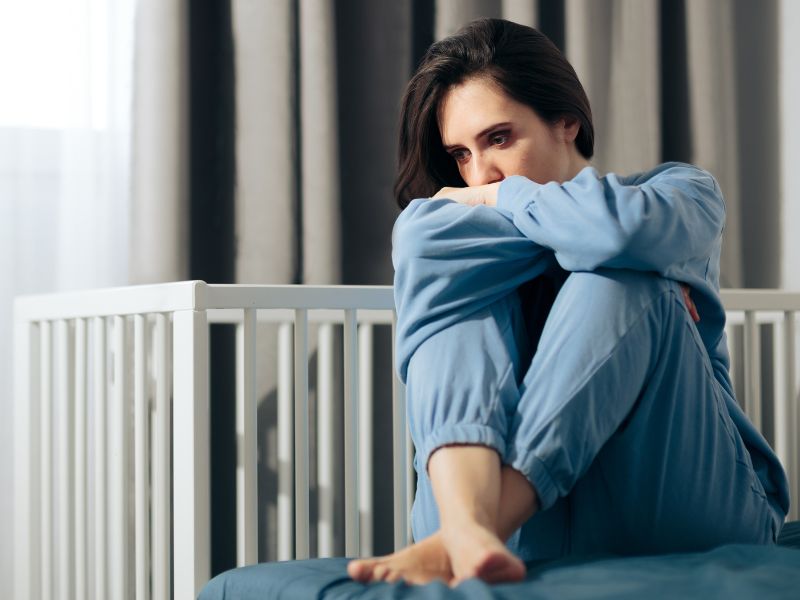For so many of us, having a baby is truly a joyous milestone. Welcoming a new life into a family can be such a wonderful and happy time.
But the truth is that many new moms experience postpartum baby blues, and some moms struggle with postpartum depression and/or anxiety. If this is you, please know that you are not alone. Help is available, and seeking treatment is vital to your wellbeing – and the wellbeing of your family.
Baby Blues and Postpartum Depression
Approximately 80% of new moms may feel sad in the days after giving birth. This is called postpartum blues, or baby blues. The mom may have trouble sleeping – beyond what is typical for moms of newborns – mood swings and tearfulness. This is a normal response to hormone shifts that occur after having a baby. Baby blues usually last about two weeks; people usually do not need medical treatment for baby blues.
Roughly 20-30% of new moms, however, have more intense symptoms that last longer. Symptoms of postpartum depression may include:
- Feeling very irritable
- Crying excessively or feeling sad most of the day
- Having difficulty sleeping – beyond what is typical when caring for a newborn
- Experiencing extreme mood swings
- Feeling overwhelmed and unable to complete tasks
- Neglecting basic hygiene, such as showering
- Feeling as if you’re not a good mom
- Thinking of hurting yourself or baby
Though the name of the condition is postpartum depression, the condition can also include symptoms of obsessive-compulsive disorder and anxiety. Some people have intrusive thoughts, which are thoughts that come and go, and you can’t turn them off. Some people have worsening of attention deficit hyperactivity disorder (ADHD).
If you or a loved one feels this way, please seek medical help. If you or a loved one are considering suicide, call or text 988, the Suicide and Crisis Lifeline.
Oftentimes, the mom may not recognize the symptoms within herself. A partner may need to sensitively bring up the subject by saying: “I am really worried about you. You are not quite yourself. Do you feel like yourself? Maybe we should see a doctor so you can be more like you again.”
Timing of Postpartum Depression
Despite its name, postpartum depression can start for some women as soon as they find out they are pregnant. As hormone levels change during pregnancy, some women start developing symptoms of postpartum depression, especially around 28 to 32 weeks of gestation when hormone changes shift significantly.
While many people don’t develop symptoms until the weeks or months after the baby is born, other women develop symptoms up to two years after giving birth.
Anyone Can Develop Postpartum Depression
Many people think that postpartum depression affects only women who have a history of another mental health condition such as anxiety or depression. While women with a history of a mental health condition are at risk for postpartum depression, postpartum depression also affects women without a prior history of a mental health challenge. According to the March of Dimes, half of women diagnosed with postpartum depression have not had a prior diagnosis of depression. So often, women say “it can’t happen to me.” But it can. And that’s why knowing the symptoms is so important.
Though there’s no way to completely prevent postpartum depression, I encourage women to create a support system before the baby is born. I tell my patients and their partners when they hit the 28-week mark that their homework is to start talking to friends and family about who is going to help with cooking, cleaning, finances and other responsibilities. Accept help. Having a network in place can help take a lot of stress off a new mom!
Treating Postpartum Depression
If you have symptoms of postpartum depression, reach out to your doctor. Your doctor can discuss treatment options, which may include a combination of:
- Therapy. Many women find that talking to a perinatal therapist can help them cope with postpartum depression.
- Medication. Antidepressants used to treat other mental health conditions may also be used to treat postpartum depression. Your doctor can discuss which ones are safe to use if you are pregnant and/or breast feeding. Brexanolone was the first medication approved by the FDA to treat postpartum depression specifically. Patients receive this drug through a continuous IV infusion that lasts 60 hours, due to its side effects. I am also interested in a new postpartum depression pill called Zuranolone, approved by the U.S. Food and Drug Administration in 2023. It isn’t widely used yet, but I am optimistic that it will be helpful.
- Self-care. Try to find time to rest, exercise, talk with friends and take care of your body.
Please remember that having postpartum depression is not your fault. There is no stigma. If you need help, please reach out to friends, family and medical professionals. If you are thinking of harming yourself or your baby, call or text 988, the Suicide and Crisis Lifeline, immediately.
Amanda Tellawi, MD, is a board-certified ob-gyn with the Mid-Atlantic Permanente Medical Group. She sees patients at University of Maryland St. Joseph Hospital.

